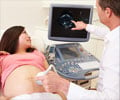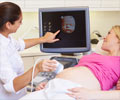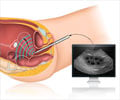A new study has raised the possibility that ultrasound is not as useful as has been suggested. In a recent article published in Ultrasound, the Journal of the British Medical
A new study has raised the possibility that ultrasound is not as useful as has been suggested.
In a recent article published in Ultrasound, the Journal of the British Medical Ultrasound Society Dr Hylton Meire has suggested that effectiveness of foetal 'nuchal thickness' as a technique for attempting to diagnose Down's syndrome in obstetric ultrasound is overstated and reliance on this surrogate marker may result in the 'loss' of normal babies.Dr. Meire predominantly emphasises the lack of scientific data to support the use of foetal 'nuchal thickness' measurements in routine clinical ultrasound practice to determine the presence of Down's syndrome.
The nuchal translucency thickness scan is an ultrasound scan performed between 11 and 13+6 weeks of pregnancy, during which the fluid at the back of the baby's neck (the nuchal translucency) is measured. Babies with abnormalities are likely to build up more fluid at the back of their neck during the first trimester, causing this clear space to be larger than average.
For the study, Dr Meire reviewed the available scientific evidence in support of the routine use of ultrasound as a screening procedure for pregnant women. He focussed on the 'routine abnormality scan', typically performed at 18-20 weeks of pregnancy, and appraisal of the foetal 'nuchal thickness' performed at 11-13 weeks as a screening procedure for chromosome abnormalities such as Down's syndrome.
He concluded that there is no convincing data showing any population benefit from the 18-20 week scan and showed that this position has been agreed by many of the world's major medical bodies for many years. Several of these bodies have expressed the need for a large confirmatory study but accept that no such study has yet been performed.
Dr Meire also revealed that the value of 'nuchal thickness' measurement has probably been overstated and the technique has not been subjected to valid scientific and statistical enquiry. Using this technique to try to prevent the births of all cases of the two most common chromosome abnormalities in the UK would lead to the loss of 3200 normal babies every year.
Source-ANI
LIN/J
 MEDINDIA
MEDINDIA
 Email
Email










